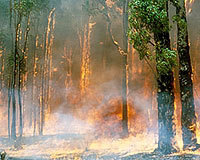| . |  |
. |
Washington (UPI) Aug 12, 2010 World wheat supplies have been sharply reduced due to severe drought and wildfires in Russia, a crop report released Thursday by the U.S. Department of Agriculture concludes. The wheat supply will be 6.6 percent smaller than in previous projections and prices, which began a steady increase in June when Russia's heat wave began, will continue to surge, the monthly report said. The crop shortage exacerbates the economic and health turmoil Russia has suffered during its worst heat wave on record and has climate change experts concerned that rising temperatures will threaten food security as fires and drought occur more frequently. "The trend is clear," said Sherri Goodman, senior vice president at the Center for Naval Analyses and former deputy undersecretary of defense for environmental security. "With increases in temperature and increasing changes in the global climate, we are experiencing more disasters." Although Russia is the world's third-largest wheat supplier, the shortage doesn't immediately threaten global supply. A good harvest season in the United States, combined with increased exports from India and Australia and ample stockpiles will help offset Russia's wheat shortages, a report by the International Food Policy Research Institute says. "There should not be any serious shortage for the coming year," said Joel Ransom, an agronomist in cereal crops at North Dakota State University. Climate experts hesitate to blame climate change for Russia's heat wave, because pinpointing the cause of severe weather requires analysis after the event is over, said Deke Arndt, chief of climate change monitoring at the National Oceanic and Atmospheric Administration. However, many experts agree that drought and wildfires are becoming more frequent and will continue to cause food shortages, rising prices and malnutrition crises. Other countries in Asia and Europe have wheat shortages as well, caused by similar heat waves, the USDA report said. "What we're seeing is that there are some short-term negative effects of warmer climates," Goodman said. "Shortages in food security can have an effect on society, and certainly it is in Russia." Record temperatures have resulted in more than 600 wildfires near Moscow, destroying almost one-third of Russia's wheat crop. The USDA slashed production estimates for the country by 15 percent, the report stated. The Russian government announced it will ban wheat exports through October, and possibly through the end of the year, to conserve supplies for animal feed. "Exporting countries will act in their interest first before thinking about how it will impact the rest of the world," said Lester Brown, president of the Earth Policy Institute. Russia broke its high temperature record twice last month, reaching 99 degrees several days and 102 degrees July 30. Moscow health officials reported the daily death toll in the city has reached 700, more than double the average. The fires are blamed for 52 deaths, official reports said. Areas at northern latitudes and toward the interior of a continent are warming the most rapidly and are most vulnerable to extreme weather changes, Arndt said. Moscow's geography roughly fits this description, as does the U.S. Corn Belt in the Midwest. If the Midwest were to have a July heat wave like Russia's, the United States could lose half its grain harvest, Brown said. The U.S. Global Research Program Climate Impact Report shows temperatures have risen faster in the Midwest's key agriculture regions by more than 7 degrees, causing concern about water shortages and insects that could threaten farmers' livelihoods and the U.S. economy. The economic effects of the Russia's extreme weather are only just beginning to take hold. Some Russian farmers have reported losing entire crops and have asked for government loans, Brown said. With less wheat for animal feed, the cost of beef, eggs and dairy is expected to rise. If the drought delays the next planting season, Russia's economy could worsen, Brown said. Many climate scientists are hopeful Russia's crisis will create a broader awareness about climate change, although Goodman remains skeptical. If the Gulf of Mexico oil spill wasn't a catalyst to move climate change legislation, it's unlikely Russia's wheat shortage will result in any immediate action by policy makers, she said. "I think the change is coming, I think it's more a matter of when," Goodman said.
Share This Article With Planet Earth
Related Links Forest and Wild Fires - News, Science and Technology
 Forest Fires Help Power The Nitrogen Cycle
Forest Fires Help Power The Nitrogen CycleMadison WI (SPX) Aug 12, 2010 When fire burns down a forest, nitrate levels go up, and the effects are persistent, according to recent research from University of Montana scientists. They found that charcoal deposited during fire events has the potential to stimulate the conversion of ammonia to nitrates, an important step in the nitrogen cycle. Led by Patrick Ball, the research team found that a type of bacteria that ... read more |
|
| The content herein, unless otherwise known to be public domain, are Copyright 1995-2010 - SpaceDaily. AFP and UPI Wire Stories are copyright Agence France-Presse and United Press International. ESA Portal Reports are copyright European Space Agency. All NASA sourced material is public domain. Additional copyrights may apply in whole or part to other bona fide parties. Advertising does not imply endorsement,agreement or approval of any opinions, statements or information provided by SpaceDaily on any Web page published or hosted by SpaceDaily. Privacy Statement |